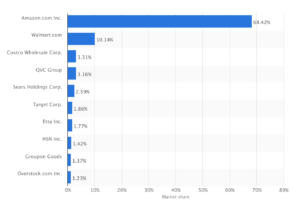Amazon: winner of current generation of e-commerce
First to enter the battle between brick-and-mortar and online retailers, Amazon has won by providing seamless one-stop shopping experience and leveraging technology to capture value. Since then, It has also evolved into a technology company. As we enter a new era of internet of things and AI, can Amazon continue to win?
Founded in 1995, Amazon started its internet retail business by selling books and then expanded to sell all goods. It has now evolved into a giant technology company that sell goods with AI and provide customers with new shopping experience powered by advance technology. Starting with an architectural innovation, it took almost a decade to experiment new business models and finally win and accrue its investment.
The rise in stock price is a strong signal that Amazon is winning[1]. Looking closer, Amazon has following attributes that make it a winner in the online retail space:
- Seamless online shopping experience
- Leveraging advanced technology and data
- Unbounded by existing business model
Seamless online shopping experience
Setting Amazon Web Service (AWS) aside, Amazon creates value by providing best online shopping experience. First, it is a one-stop shop. Starting by offering the most comprehensive selection of books, it saved consumers trips across cities to find books. Then it expanded to include other goods, and now customers can almost get everything on Amazon. In addition, it ensures low price, fast delivery and easy return to compete with both brick and mortar and online retailers. Thus, it would be as similar as to buy and return goods in a physical store. Launched in 2015, Prime Now can deliver goods to members within an hour[2].
In addition to fulfilling basic expectations of shopping experience, Amazon offers new services, such as 1-Click shopping, reviews, recommendation, and AI robots, Alexa, to assist and facilitate consumers’ shopping experience. Consumers, may initially be attracted by Amazon’s vast options or convenience, and then stick with Amazon for its seamless service.
Leveraging advanced technology and data
However, if it is only about creating values, Amazon is not winning. It is winning now because it is also able to capture value through selling a wide range of products and services to customers at low cost.
Just like other internet retailer in the 90s, it did not need physical store to start with at the beginning. In addition, it operated differently. Instead of storing all the goods it sells, it only kept fraction of it and ordered from distributors until a customer has placed an order. This largely increased inventory turnover and allowed flexibility in financing sales[3]. New types of relationship with distributors and customers were emerging, and Amazon was a pioneer in the field.
Amazon identified this new trend and embraced it by experimenting with advanced technology and data analytics. For example, Amazon adopted the concept of Big Data Analytics fairly early. It studied the behaviors of its customers to serve them better, such as by making recommendations, and learned patterns from data to optimize logistics and service. Just like Target used predictive analytics to predict needs and send out coupons, Amazon applied analytics to forecast sales and speed up delivery[4]. It also kept trying different new technology, such as drones, to facilitate the whole deliver process while lowering the cost. It has now developed a warehouse management system and a driver-facing app that allows same day delivery with manageable cost[5]. As such, Amazon is able to capture the value while staying competitive and leading the e-retail industry [6].
Unbounded by existing business model
Another key element that contributes Amazon’s current success is that the organization is never stop innovating, including innovating in architecture. AWS is a great example. Amazon need data warehouse to store and process large data and orders generated on amazon.com. The managerial team was prudent to the need of similar infrastructure from smaller online retailers and open to extend this as another business of Amazon. Amazon is not confined in its own internet retail business but further advance with technology. For its investment in technology, such as big data and AI, it developed Alexa to compete with Apple and Google. It hence also evolves into a technology company.
For these three elements, Amazon is definitely winning the game it starts with Barnes & Nobles. At the same time, it is also entering a new game with other technology giants, such as Google and Apple. It is remained to be seen how this game about AI and smart home to be played out.
[1] Google Finance as of Feb 2, 2017
[2] Amazon 2015 Annual Report
[3] INVESTING IT; Does Amazon = 2 Barnes & Nobles, July 19, 1998, see: http://www.nytimes.com/1998/07/19/business/investing-it-does-amazon-2-barnes-nobles.html
[4] Why Amazon’s Anticipatory Shipping Is Pure Genius, Jan 28, 2014, see: http://www.forbes.com/sites/onmarketing/2014/01/28/why-amazons-anticipatory-shipping-is-pure-genius/#7754e3b02fac
[5] Amazon 2015 Annual Report
[6] Chart from statista: https://www.statista.com/statistics/293268/mass-merchant-us-e-retailers-market-share/






Hi,
It is very interesting to note the way Amazon’s sustainable innovations. What I find interesting is the fact that they are expanding their device portfolio – Alexa and Echo is a great addition to kindle. It remains to be seen whether they would diversify their business into hardware.
Indeed! I think for the next, HW is as important as SW